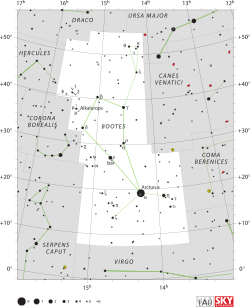Boötes
Appearance
| Constellation | |
 | |
| Abbreviation | Boo |
|---|---|
| Pronunciation | /boʊˈoʊtiːz/[1] |
| Symbolism | the herdsman |
| Right ascension | 15 |
| Declination | +30 |
| Quadrant | NQ3 |
| Area | 907 sq. deg. (13th) |
| Main stars | 7, 15 |
| Bayer/Flamsteed stars | 59 |
| Stars with planets | 9 |
| Stars brighter than 3.00m | 3 |
| Stars within 10.00 pc (32.62 ly) | 3 |
| Brightest star | Arcturus (α Boo) (−0.04m) |
| Meteor showers | |
| Visible at latitudes between +90° and −50°. Best visible at 21:00 (9 p.m.) during the month of June. Other designations: Arctophylax | |

Boötes, pronounced with both 'O's as 'boötez',[1] is one of the 88 modern constellations in the northern sky. The name is from the Greek word Βοώτης, which means herdsman – someone who takes care of animals.
Shape
[change | change source]The constellation's shape is like a kite. Boötes has the third brightest star in the night sky, called Arcturus (α Bootis).[2] The astronomer Ptolemy listed it in the 2nd century when he made a list of 48 constellations.[3]
The Cloverleaf quasar is visually in Bootes.
Main stars
[change | change source]- α Bootis (Arcturus) is the brightest and most important star of the constellation, with a magnitude of -0.04, the 3rd brightest star of the sky. It is an orange giant star
- β Bootis (Nekkar), yellow giant with magnitude 3.49 and 219 light years from the Earth
- y Bootis (Ceginus), Delta Scuti variable with magnitude 3,04
- δ Bootis (Princeps), another yellow giant.
Deep-sky objects
[change | change source]- NGC 5248, spiral galaxy, 10º south of Arcturus
- NGC 5466, globular cluster, 9º northwest of Arcturus, near M3, a globular cluster in the constellation Canes Venatici.
References
[change | change source]- ↑ 1.0 1.1 Thompson, Robert Bruce; Thompson, Barbara Fritchman (2007). Illustrated Guide Astronomical Wonders. O'Reilly Books. ISBN 978-0-596-52685-6.
- ↑ Jim Kaler. "Boötes". Stars. Retrieved 27 January 2013.
- ↑ Fuchs, Jim. "Constellation History". Modern Constellations. Archived from the original on 25 May 2012. Retrieved 27 January 2013.
